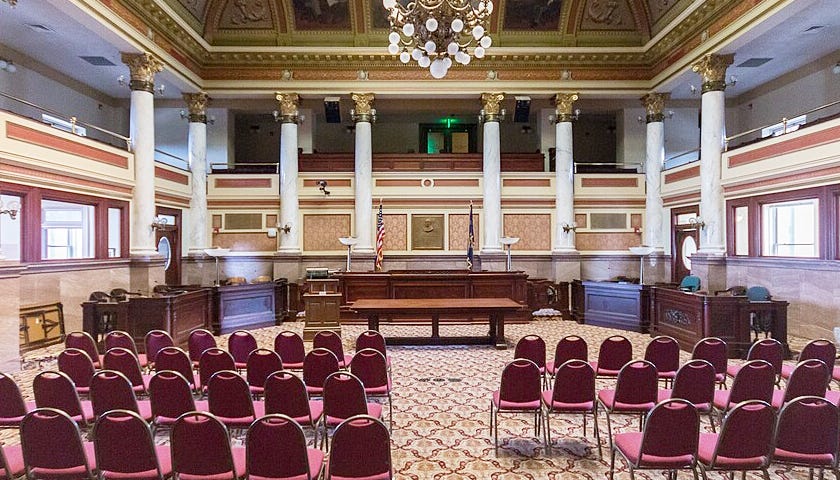Constitutional Expert Critiques Montana Supreme Court: ‘Totally Off the Rails’
"Hardly Qualifies as Being a Court at All"
A constitutional expert criticized the Montana Supreme Court for its judicial activism.
“This is not an ordinary case of judicial activism. This is a court that is totally off the rails, unlike anything I've ever seen in the United States before,” Rob Natelson said. Natelson spoke to The Montana Chronicles in his personal capacity on December 28, 2024.
He added that the Montana Supreme Court “hardly qualifies as being a court at all.”
Natelson said that anyone who isn’t a “hardcore leftist has to realize that this poses a risk to democracy” and the “rule of law.”
The Montana Supreme Court has come under fire from conservatives for its recent decisions. In 2024, it ruled in favor of the youth plaintiffs suing Montana over climate change. Also, in the same year, the state Supreme Court struck down laws dealing with election integrity, abortion and gender transition treatments for minors.
“The court has assumed a level of control over Montana policy that makes it a virtual oligarchy,” he said.
“Some people will say we've seen these kinds of charges before. Are you just objecting to the court because it's liberal? There've been charges of liberal activism in courts before. This is far beyond anything I've ever seen in my legal career of 54 years.”
Natelson served as a law professor at the University of Montana for 23 years. His work has been cited by the U.S. Supreme Court justices 39 times in 11 cases. Also, according to the Independence Institute, Natelson’s work has been cited in federal appeals courts and state supreme courts. Currently, he serves as the Independence Institute’s senior fellow in constitutional jurisprudence.

According to Natelson, issues with competence for the Montana Supreme Court go back many years.
“The first article I ever wrote on Montana Supreme Court law was written in 1990. So, quite a while ago,” he said. “And at that time, I discovered that they were not following statutes that have been passed by the legislature, either ignoring them entirely or misconstruing them.”
The paper he wrote was called “Running With The Land In Montana.”
Natelson added that the state Supreme Court “has a tendency to not be very competent, and at times, it’s even a bit abusive.”
The former law professor said he has encountered times where the court was “vindictive.”
“I criticized the court as a law professor; one of the justices wrote a letter to the dean urging him to deny me a promotion because I criticized the court,” he said.
Also, Natelson cited that when Attorney General Alex Knudsen criticized the Montana Supreme Court, the state’s Commission on Practice recommended suspending his law license for 90 days. The state Supreme Court will make a ruling based on the commission’s decision.
The commission members, who are appointed by the Montana Supreme Court, serve four-year terms.
Natelson said he didn’t know exactly when, but he said the state Supreme Court has made a “hard left turn.”
Natelson said a critical point came in 1999 when the state Supreme Court justices made three decisions that effectively “established a veto over any constitutional amendment that the people wanted to adopt.”
The three cases he called the “toxic trio” are Marshall v. Montana, Armstrong v. State and Montana Environmental Information Center (MEIC) v. Seven-Up Pete Joint Venture.
In a report he wrote for the Frontier Institute called “The Montana Supreme Court: An Institution in Need of Reform,” Natelson said in the Marshall case, “the plaintiffs challenged a constitutional amendment requiring popular approval of tax increases.”
“The court ignored the issue of standing, took the case without a prior district court hearing, held no factual hearing itself, and struck down the constitutional amendment,” he wrote.
Natelson also wrote that by its decision, the state Supreme Court “allocated to itself power to veto the people’s decisions in amending their state constitution.”
In the Armstrong case, this case established a right to abortion in Montana.
“The Montana Supreme Court decided that despite legislation to the contrary that existed for many years, there was an absolute right to abortion in Montana,” according to Natelson.
“When the state Constitution was adopted, the voters were told that abortion was not part of the state constitution. That was a matter for the legislature,” he told The Chronicles.
“Effectively, the court has announced that it is the final arbiter on Montana social policy,” he added.
In the MEIC case, it dealt with when a mining company applied for exploration licenses. The Montana Supreme Court overturned the licenses of the mining company.
“MEIC held that under the Montana Constitution’s Article II environmental right, any government action must be justified by a ‘compelling state interest’ if it ‘implicates’ the environment,” Natelson wrote in his report.
With this decision, the state Supreme Court established a veto over “legislative environmental policy,” Natelson told The Chronicles.
Natelson said passing a constitutional amendment that would change how the state Supreme Court is set up and the rules applied would be a solution. However, he said this idea is “not feasible” because “the court has taken control of the constitutional amendment process and strikes down anything it doesn't like.”
“Over the past few decades, they have an almost unbroken pattern of striking down conservative ballot issues while upholding liberal ballot issues,” he added.
Due to the justices “striking down legislation they don’t like,” the Montana Legislature has “to proceed in a very deliberate, cautious way,” according to the former law professor.
One solution Montana can do to fix its state Supreme Court, according to Natelson, is to have judicial elections with party designations.
“For various reasons unique to Montana, nonpartisan elections have not worked in that state,” he said. “And so if people could know whether a judge they're voting for is a Republican or a Democrat, that would at least give them more information about the judges they're voting for.”
Natelson added that judicial elections with party designations allow the parties to put out information about the candidates.
He added that the State Legislature will propose legislation to make these elections partisan.
Natelson said that if this law was passed, it would be “difficult to see what excuse the Montana Supreme Court could use to strike that down.” However, he did say that the state Supreme Court is “very good at coming up with excuses.”
At times, according to Natelson, the Montana Supreme Court is “forced” to uphold laws the state legislature passes due to “political pressure or other circumstances.”

If the legislature passes enough of these types of laws, according to Natelson, “some of them are likely to survive.”
“If the Supreme Court strikes them all down, then that communicates a message to the people of Montana that their elections don't matter anymore,” he said.
Another idea being “seriously considered” by the Montana Legislature is mandating the justices to run in separate district elections, according to Natelson.
“Montana is a very large state. It doesn’t have major population centers,” he said.
“The advantage of running in districts is that people are more likely to know who their local candidates are,” he said.
The current system has led to a few counties “dominating the bench,” and justices from Helena “tend to be disproportionately represented,” Natelson said.
Natelson said that the Montana Legislature had passed this type of bill twice before, but the state Supreme Court struck it down. If the legislature does pass it again, Natelson said the bill should have “a recital, a series of whereas clauses, setting forth what the facts are. That would make it very difficult for the court to overturn it.”
The two case names for these bills are Reichart v McCullough and McDonald v. Jacobsen.
The former law professor said the Montana Supreme Court’s decisions on constitutional issues, ballot issues and land use issues have not been good.
“What joins all of those areas is that they involve matters of special expertise that the average justice might not have. One idea, which I know is going forward, is to establish a new specialized court called the chancery court,” Natelson said.
On December 16, 2024, State Sen. Tim McGillvray introduced Senate Bill 52, creating a chancery court in Montana.
According to Natelson, this court would hear cases about land, business, constitutional issues and ballot issues. He added that this type of court would “consist of judges who would be picked for their expertise.”
He said that if a case did get through the chancery court, it could still get appealed to the Montana Supreme Court. However, Natelson added that the “hope” is that if this case gets “tried and reviewed by competent judges who know what they're doing,” they will “provide some kind of context,” so the state Supreme Court “is less able to come up with a bad decision.”
Natelson said these courts, sometimes called business courts, are very common in states.

Another advantage to these courts is that the judges can “adjudicate business cases faster,” which can attract more businesses to a state, according to Natelson.
The former law professor said that the Montana Legislature can’t add any additional seats to the state Supreme Court. The Montana Constitution only allows for either five or seven justices.
Natelson said that another thing he thinks should be done is to change the impeachment standards.
He added that in most states, the “grounds of impeachment” are decided by their constitutions, but in Montana, these “standards are set forth by statute.”
Natelson said Montana’s current statute for impeachment is “unclear” and “ambiguous.”
“If that statute could be changed to justify removal for oppressive conduct or incompetence, negligence, and grounds like that, I think that would send a message to the court. In fact, it would send a message to all officers that in order to avoid impeachment, they've got to conduct themselves in a good way. They can't just do what the Montana Supreme Court does and assume they're going to get away with it.”
Natelson said that the legislature would not remove justices anytime they didn’t like them because a two-thirds vote would be required from the State Senate and State House. This high threshold prevents justices from being impeached for “light and transient causes,” Natelson said.
“Negligent conduct, incompetent conduct, oppressive conduct should not be tolerated, and it should be subject to impeachment and conviction and removal,” the former law professor said.
Natelson said the Montana Supreme Court could “strike down” every judicial reform law, but “as a practical matter, it's a matter of self-preservation,” he said.
He added that the Republican Legislature needs to “figure out how it can reform the system.” The constitutional scholar said the Republican Legislature also needs to be “very clear with the people” about “what it’s doing and why it’s doing it.”
The Montana Supreme Court wants to stop the Republican Legislature “from fully implementing its agenda,” Natelson said.
With all this being said, Natelson does see some encouragement in the future of the state Supreme Court.
In November 2024, Cory Swanson was elected the next chief justice. Swanson beat Jerry Lynch by gaining 54.3 percent of the vote.
Natelson said the Montana Supreme Court is getting a new chief justice who he thinks will be a “good deal better.”

Swanson, who is a former student of Natelson, was chosen as the next chief justice. According to the former law school professor, this was the first good election result for the Montana Supreme Court in many years.
Previously, Swanson served as the Broadwater County Attorney.
“I believe what Montana voters are telling all of us daily is they want a fair and impartial Supreme Court. That's what I want to do. I want to get politics out of the court as much as possible," Swanson said while running for chief justice, according to montanarightnow.com.
The Chronicles attempted to contact the Montana Supreme Court, but it did not respond before publishing time.
- - -
Zachery Schmidt is the founder of The Montana Chronicles. If you have any tips, please send them to montanachronicles@proton.me.






